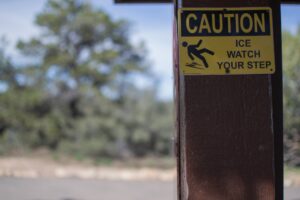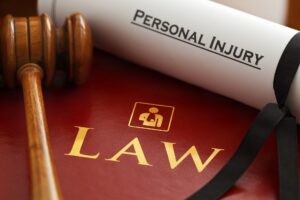Slip and fall accidents are common in winter anywhere in the state, especially when there is plenty of snow and ice around. In fact, slip and fall accidents are the most common type of accident after car accidents. If you are walking around when the weather has been wet, snowy or icy, you should take extra care as the surface of driveways, steps and sidewalks are likely to be slippery. If you have slipped over and injured yourself, you could be facing an extra financial burden caused by the injury – medical treatment and lost earnings can set you back even if you are insured. If you have good reason for believing that the accident was not due to your own carelessness but instead was caused by negligence on the part of whoever was responsible for the maintenance of the place you slipped over, you may be able to obtain compensation through a personal injury claim.
Slip and fall accident claims are notoriously difficult to win and if you are claiming against someone’s liability insurance you will find you could be up against an insurer determined to suggest that you didn’t take enough care and were at least partly to blame. You really need to know who is liable for slip and fall accidents on sidewalks and driveways, and how to support your PI claim with evidence. It also pays to hire an experienced personal injury attorney to help you with your claim.
Who is potentially liable for a slip and fall accident in Massachusetts?
Generally, the individual, business or government agency (typically a municipality) that owns the property where you slipped over could be liable for your injuries if you can prove that their negligence contributed to the accident.
Individual homeowners, for example, are responsible for their own driveways, walkways and sidewalks that are on their property. They are expected to maintain them so that they are not unsafe to use. If there is a storm, many municipalities across the state expect property owners to clear the snow or ice accumulation as soon as they can after the storm has ended.
Similarly, businesses and other private organizations are responsible for any of their property that is open to the public and could be liable if lack of timely maintenance contributes to an accident.
Government agencies, such as municipalities, are responsible for most other public areas such as parks, roads and sidewalks.
Proving liability can be a challenge
To have a reasonable chance of claiming compensation after a slip and fall accident, you must be able to prove several things in combination:
- Your injuries were caused by an accident on someone else’s property;
- You had taken reasonable care to avoid slipping over;
- Your accident was caused by negligent maintenance by the property owner.
The first point can be substantiated by photos of the accident scene (most cell phones take photos), eye witness statements, security camera video footage, evidence of medical treatment by your doctor and/or hospital related to the injury.
The second point is not easy to prove, but it makes sense not to admit fault. This is the point which could be most hotly contested by the defendant’s insurer, who will attempt to blame you for your own carelessness.
The third point must show that the property owner could have avoided the accident if proper care had been taken to prevent slippery conditions, e.g. clearing snow and ice, salting, repairing broken paving or drains, etc. In many municipalities, there are by laws which make property owners responsible for clearing unsafe conditions within 3 hours of the cessation of a storm, opening up the possibility of liability in the event of an accident.
Massachusetts’ comparative fault law
It is common to be accused of being at least partly at fault, e.g. you didn’t take enough care when using a driveway, for instance. Even if you strenuously deny any fault of your own, you may still end up not being awarded the entire amount you claimed in damages. The state of Massachusetts has what is called a modified comparative fault law for cases where there is shared fault (usually when this has been determined by a judge after assessing both plaintiff’s and defendant’s evidence). Basically, you are only entitled to claim any compensation at all if you were less than 50% at fault in a shared fault situation (i.e. you and the property owner shared the blame for the accident equally). Your claim is then reduced in proportion to the percentage fault that has been determined. So, say you have claimed a total of $10,000 in damages, but after a court case that has determined that you were 10% to blame for the accident, you could only obtain a maximum of $9,000 (i.e. a reduction of 10%).
Statutes of limitation
Note that like other civil claims, personal injury claims must be filed within a specified time dating from the accident if they are to be valid. For claims against private property owners, this is 3 years, but if you are making a claim against a town or city or any other government agency, this time limit is massively reduced to only two months from the date of the accident. If you take too long to file your claim, you could lose any chance of obtaining any compensation. This is one more reason to hire an experienced personal injury attorney to help you obtain the compensation you deserve.
For more information, visit our website Mucci Legal or contact us for a free legal consultation today.


